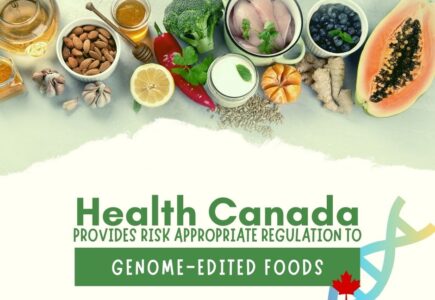Genome-edited crops and foods are no different from other products
The importance of, and reliance upon, evidence-based regulations was reaffirmed last week in Canada! It was very welcomed news when Health Canada announced that genome editing (GEd) technologies used to develop new food products will now be regulated as equivalent to conventional technologies, and will not require any additional regulatory oversight. Since 1995, Health Canada has been regulating innovative technologies and has compiled conclusive evidence that any potential risks from a genome-edited food are not different from the risks of any other food. Based on this extensive knowledge and experience, Health Canada determined that with no difference in the potential for risk from GEd technologies, there is no need to apply additional regulatory requirements.
This decision of equal risk of genome-edited and conventional foods and crop opens up the commercial opportunity for Canadian food production. Regulations can frequently act as a barrier to the commercialization of new crops and food product investments. This is especially the case when the regulations in one country are more onerous than in a neighbouring country, and investments will naturally move to the country with the most efficient regulatory framework. In 2018, the US announced that it would not apply additional regulations to GEd technologies, resulting in Canada lagging behind the US in terms of regulatory efficiency. Canada has a lengthy history of regulatory burden on innovation, with one 2018 report ranking Canada in 53rd position in terms of regulatory efficiency, one of the lowest rankings for any of the G20 countries.
No evidence of increased risk
Canada has finally finished their long risk assessment and suggested regulations for GEd foods that is neither novel nor the first country to make similar conclusions. Several countries have examined the potential for risk from genome-edited products and concluded that if no foreign DNA was present in the final variety, then the genome-edited product wouldn’t require an additional risk assessment. These countries include Argentina, Australia, Brazil and the USA, all of which are major crop-producing competitors of Canada. Having assessed hundreds of evidence documents for genetically modified crop variety approvals, Health Canada has a vast knowledge of potential risks. In their assessment of genome editing technologies, Health Canada states that genome-edited technologies won’t require additional regulatory assessment as long they are foods derived from plants with genetic modifications that do not:
- alter an endogenous protein in a way that introduces or increases similarity with a known allergen or toxin relevant to human health;
- increase levels of a known endogenous allergen, a known endogenous toxin, or a known endogenous anti-nutrient beyond the documented ranges observed for these analytes in the plant species;
- have an impact on key nutritional composition and/or metabolism;
- intentionally change the food use of the plant; and
- result in the presence of foreign DNA in the final plant product.
These five aspects of the revised regulations align with the regulations of other countries, helping to ensure that Canada doesn’t have a regulatory burden in the ability to apply genome editing technologies.
Accumulation of evidence
With such a lengthy history of risk assessment and regulation of other innovative crop breeding technologies, such as genetic modification, Canadian regulatory scientists have gained a deep understanding of the science that underlies innovative plant breeding. While genome editing is the newest plant breeding technology to be developed, Health Canada recognizes that “there is now over 25 years of regulatory experience evaluating the risks that rDNA products might have on human health (Health Canada, 2021b). To date, there have been no adverse health effects directly attributable to rDNA technology, or from rDNA-derived foods(NAS, 2016; EC 2010; Nicolia et al., 2014; Pellegrino et al., 2018).”
It is this existing stock of knowledge that ensures that Canada has effective regulations that certify that food products are safe for Canadians. This evidence is crucial for product-based regulatory systems, such as the system used in Canada, where accumulated evidence can better inform each subsequent decision.
Benefits for Canadians
In my opinion, this regulatory decision will benefit all Canadians. The results of this regulation should mean a reduction in time and cost to develop new crop varieties. The benefit of this is that as climates change continues, plant breeders will be able to get new crops, fruits, and vegetable varieties commercialized more rapidly, which will benefit us as consumers. In addition to having timely solutions to the growing concerns of food production, the time saved from the additional regulatory inquiry of risk will help keep food prices lower. Having crops and food crops that can sustain yields as climates change is crucial to ensure that Canadian food security doesn’t decrease as the climate changes. Not to forget, with genome-edited foods, food scientists can explore improving the nutrition, and the freshness of the produce, and seek out traits consumers are seeking in their food. As a result, there is an opportunity for everyone to benefit from this new Health Canada regulation.


